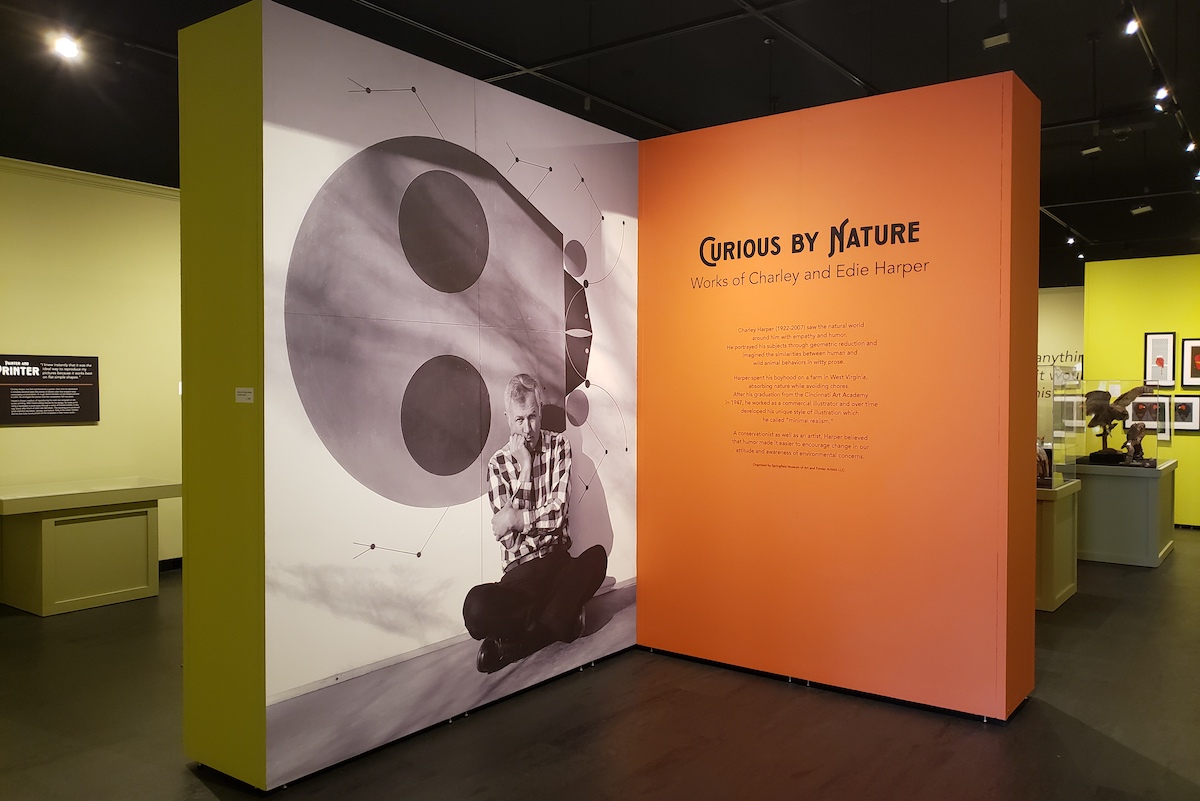Artful Animal Nature, at Santa Barbara Museum of Natural History
Work by Charley and Edie Harper Elevates Itself Beyond Standard Commercial and Animal Art

Given its bold color scheme, crisp interlocking parts, and eye for wit and clarity, Charley Harper’s art can be readily traced back to his roots as a commercial artist. But wait, there’s more: as seen in the exhibition Curious by Nature: Works of Charley and Edie Harper, at the Santa Barbara Museum of Natural History, the late artist (1922–2007), developed a signature style and made his way upward into the realm of fine art — or at least its outer fringes.
A traveling affair organized by Springfield Museum of Art and Fowler Artistic LLC, the show finds a happy and logical home at the museum, a repository of animal life — well, stilled, taxidermy animal life. Harper, born on a West Virginia farm and imbued with a passion for animals that only intensified in his later years, focused on the animal kingdom as both iconography and graphic launch point.

Harper’s unique visual voice extended and evolved naturally from the demands of commercial art, with its clean lines and functions, into a mode of what he ultimately dubbed “minimal realism.” Reductive impulses were key in creating a format of flat colored planes and neatly delineated lines and designs, well-served by the media of serigraphs and silk-screen prints. He stripped away excess and savored layered visual elements, to create works of energy and, well, curiosity.
Through his discerning eye and hands, animal portraiture is transformed into echoing, rhythmic visual patterns, as seen in the culling of faces in “Foxsimiles” (yes, punning and rubbery wordplay were part of his creative MO) and the suggestion of multiple wing motion lines in “Puffin.” Sight gags combined with punster turns, in such pieces as the animated school of fish in “Skipping School,” the blur of interwoven zebra stripes of “Serengeti Spaghetti,” and the blur of the organized flight patterns of “Birds of a Feather.”
Odes to nature and art-making tactics playfully merge and marry in this show, as do aspects of both structural strategies and representational art. Trees function as vertical grid markers in front of animal subjects in “Crow in the Snow” and “Bear in the Birches.” “Yellow-Bellied Sapsucker” presents a busy woodpecker and its imagined handiwork, a neatly hole-pocked tree looking like a slab of perforated hardboard.

One of the more attention-seizing works in the gallery leans in a more mystical direction than others here: “Largemouth Bass and Luna Moth” depicts both the fish and insect in question, roughly in the same scale, but they appear surreally afloat in some ambiguous ocean/night sky liminal space. Graphic means turn quasi-cosmic, to alluring and happily befuddling effect.
In the back space of the gallery, we find Edie Harper’s charming art, similar to her husband’s but distinct. She had her own sense of whimsical graphic style, with a lighter, more folk art–evoking touch. The realm of children’s-book illustration style springs to mind, as in the piece “Up, Up and Away.”
Wherever Harper and his fellow artist wife happen to fit on the vague, fickle index of low-high art status, the current museum show exerts an unusually wide appeal. Viewers of the “all ages” category, graphic and fine artists alike, can appreciate these vibrant visual treats.
Call it art perfect for summer viewing. While paying a visit, with or without kids in tow, head over from the Butterflies Alive! exhibition to the Maximus Gallery’s current show, Drawn by a Lady: Early Women Illustrators, and then head over to the Courtyard Gallery’s Harper show for a colorful, artful eyeful.
Curious by Nature: Works of Charley and Edie Harper is on view at Santa Barbara Museum of Natural History (2559 Puesta del Sol) through September 10. See sbnature.org.





You must be logged in to post a comment.